人教版(2019)选择性必修第一册 Unit2 Looking into the Future 真题训练(含解析)
文档属性
| 名称 | 人教版(2019)选择性必修第一册 Unit2 Looking into the Future 真题训练(含解析) | 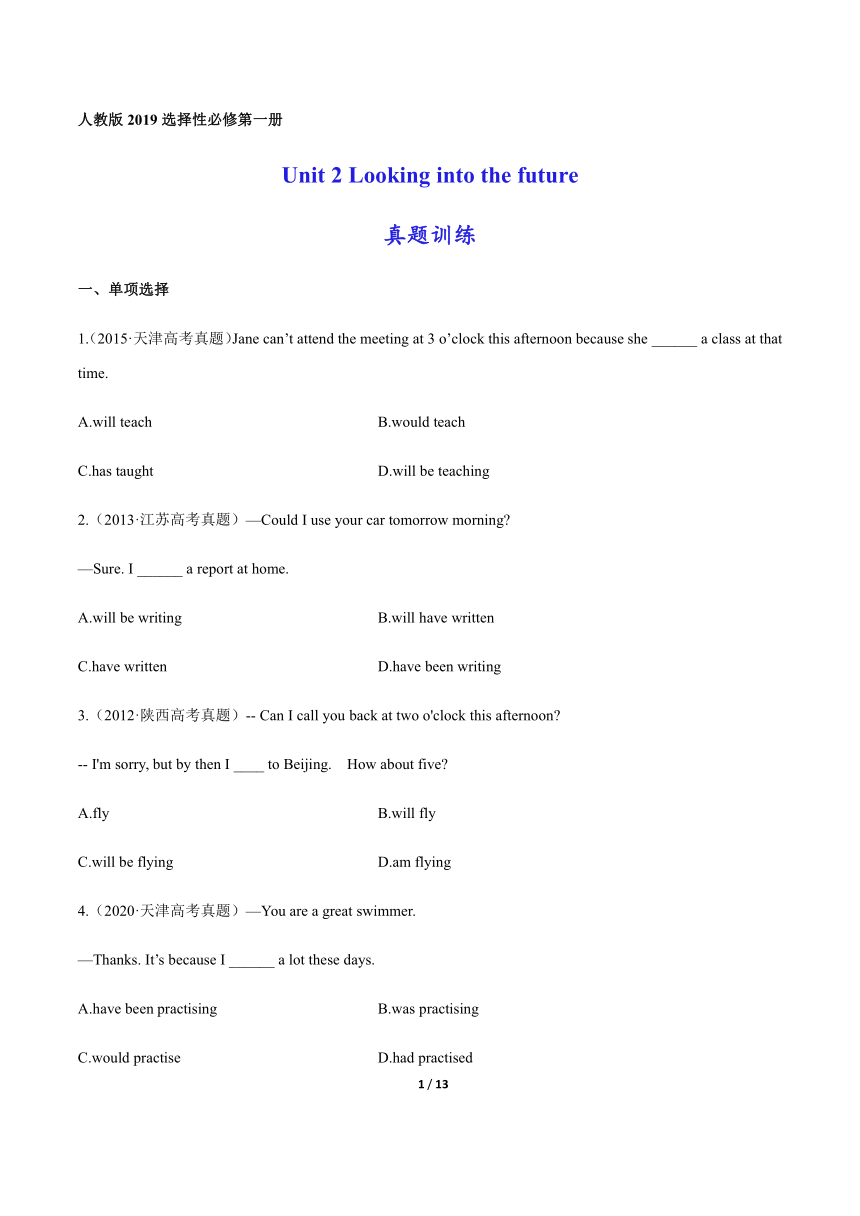 | |
| 格式 | docx | ||
| 文件大小 | 29.0KB | ||
| 资源类型 | 教案 | ||
| 版本资源 | 人教版(2019) | ||
| 科目 | 英语 | ||
| 更新时间 | 2023-03-11 14:16:18 | ||
图片预览

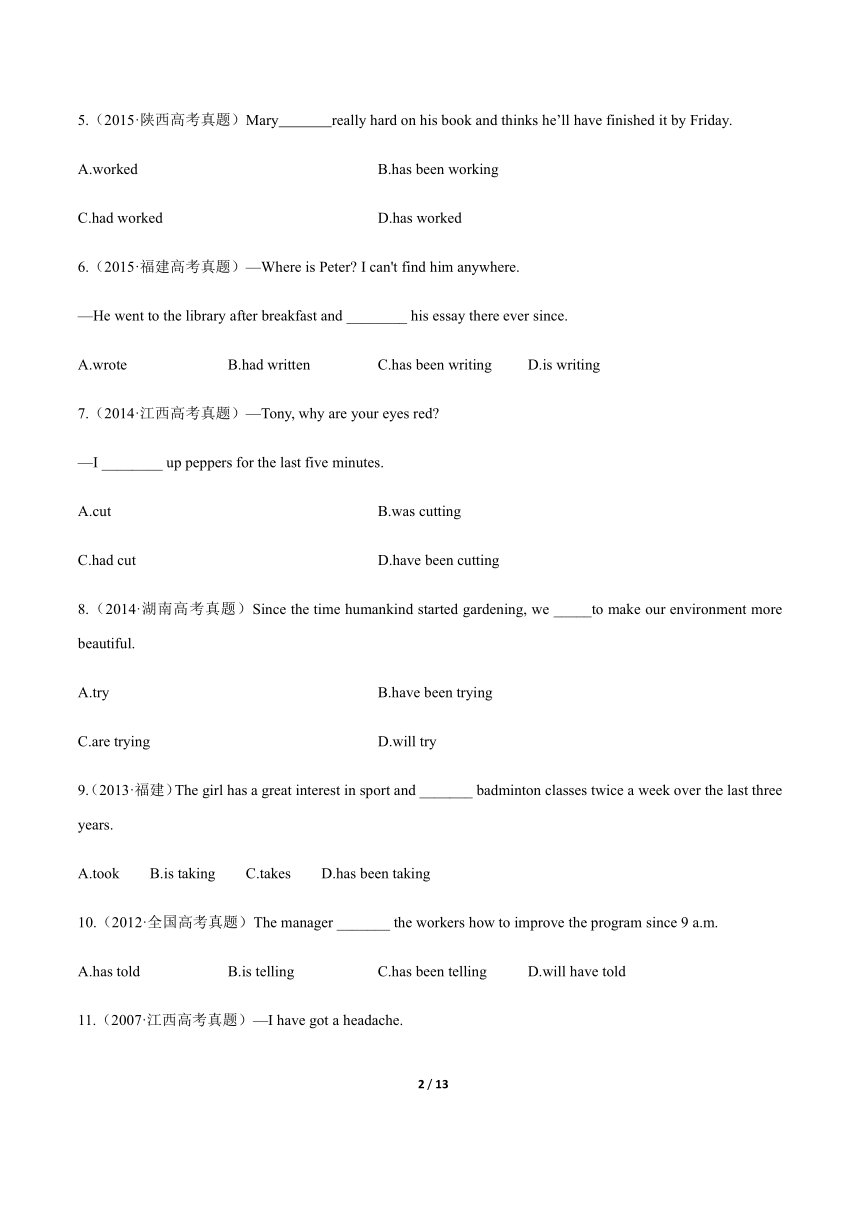
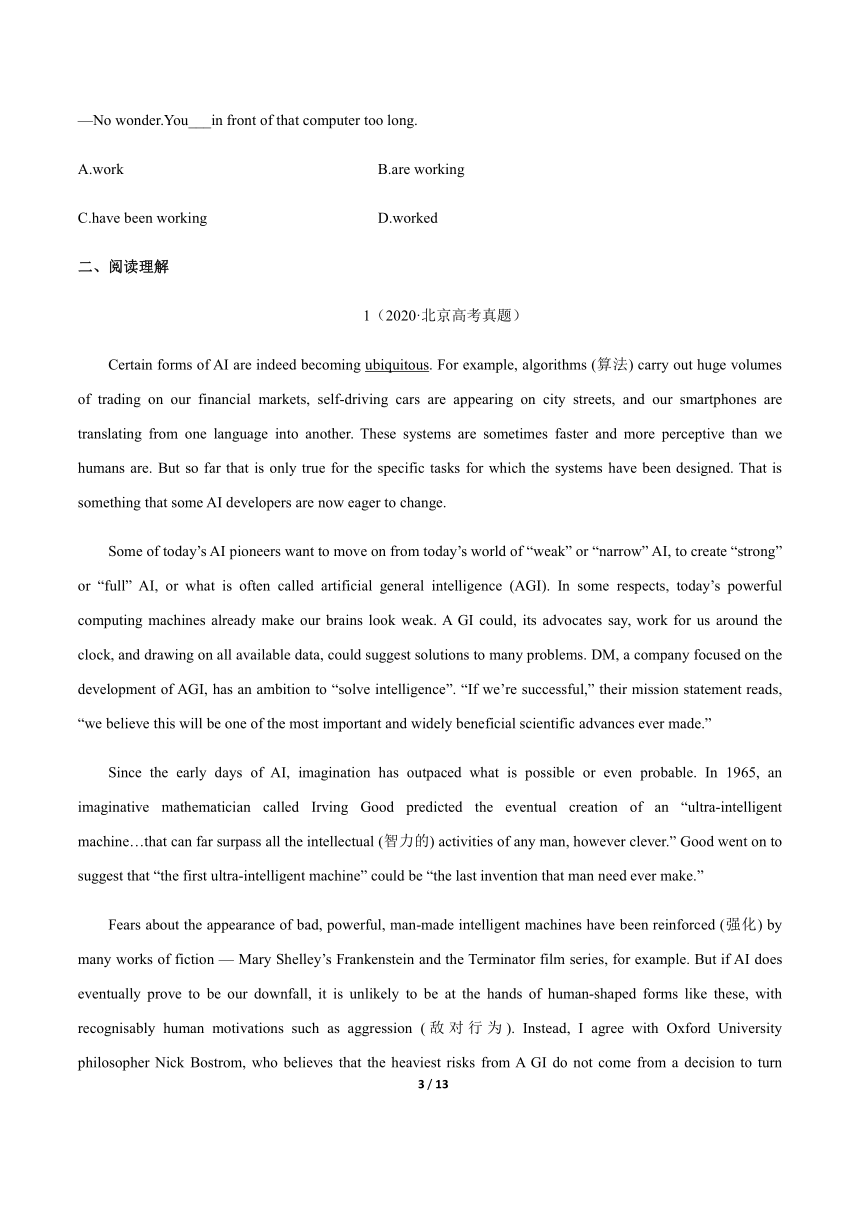
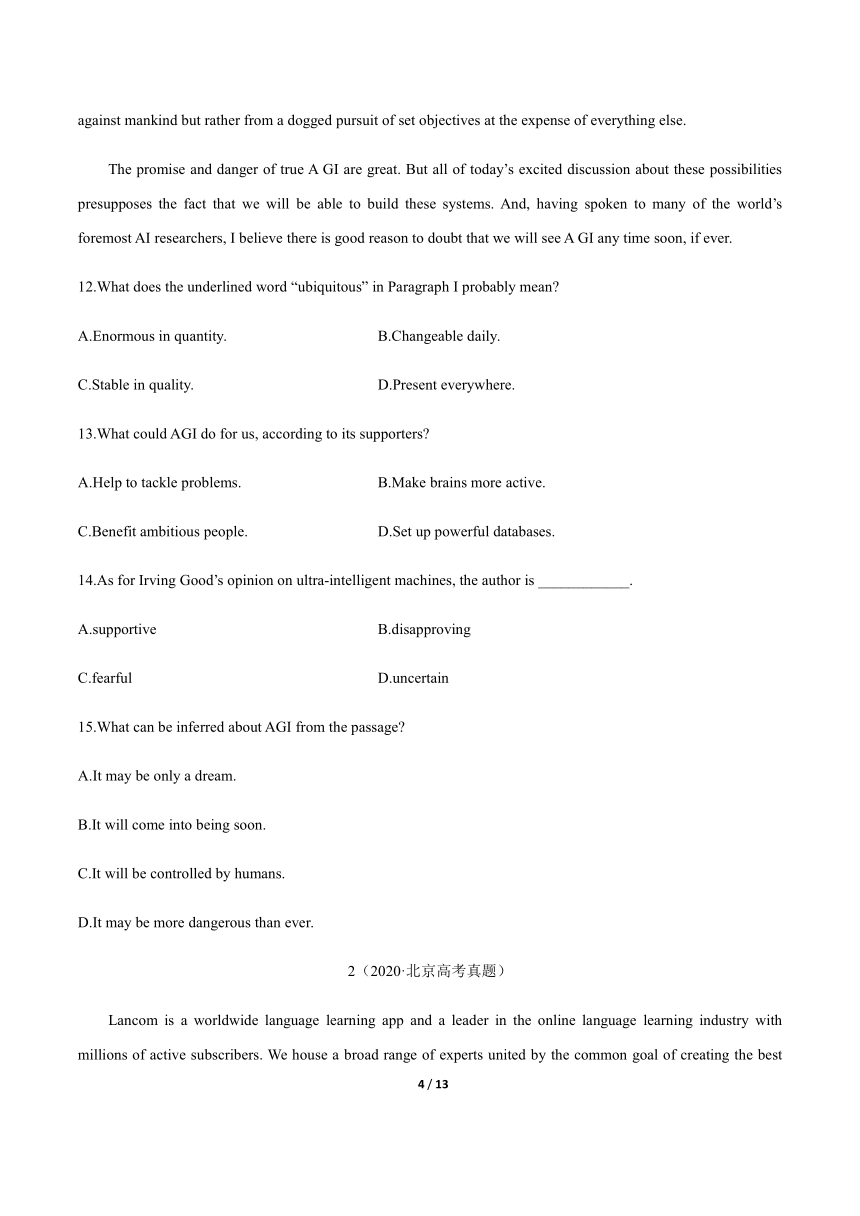
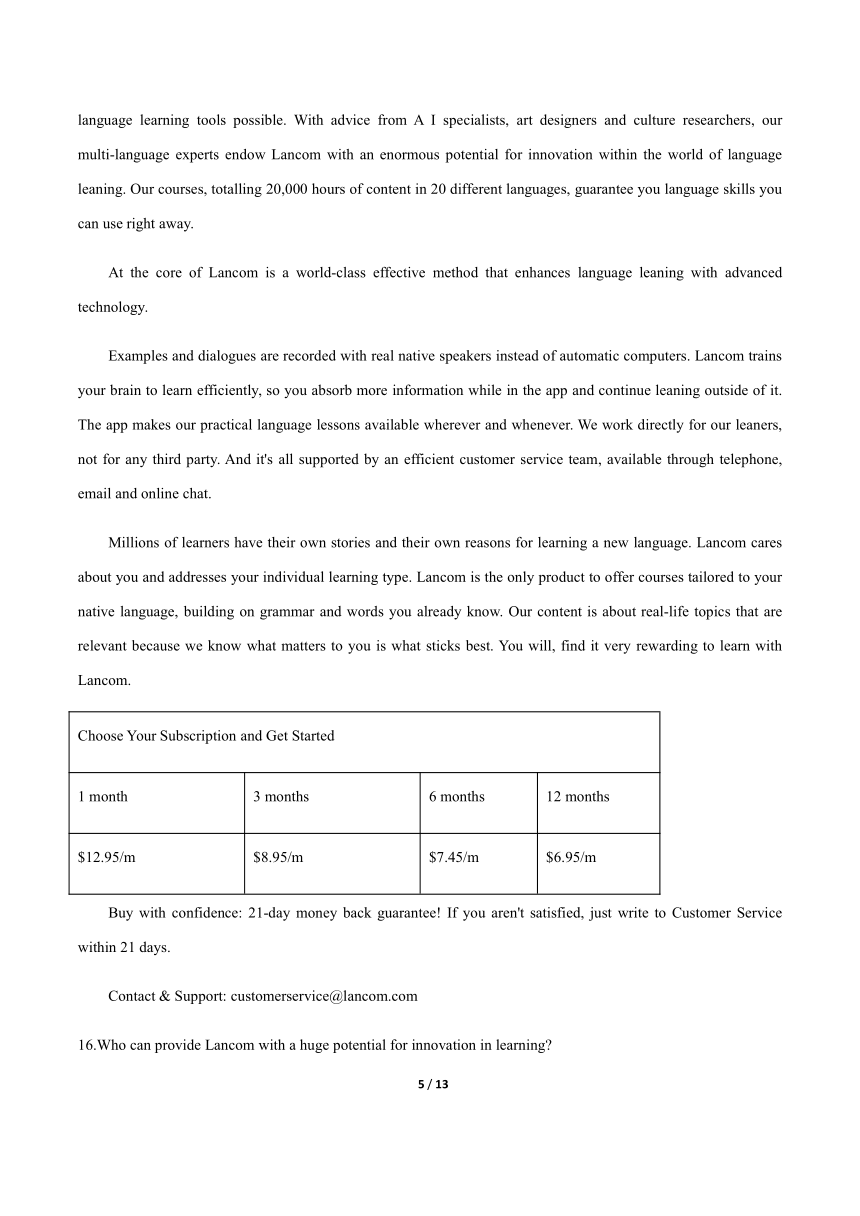
文档简介
人教版2019选择性必修第一册
Unit 2 Looking into the future
真题训练
一、单项选择
1.(2015·天津高考真题)Jane can’t attend the meeting at 3 o’clock this afternoon because she ______ a class at that time.
A.will teach B.would teach
C.has taught D.will be teaching
2.(2013·江苏高考真题)—Could I use your car tomorrow morning
—Sure. I ______ a report at home.
A.will be writing B.will have written
C.have written D.have been writing
3.(2012·陕西高考真题)-- Can I call you back at two o'clock this afternoon
-- I'm sorry, but by then I ____ to Beijing. How about five
A.fly B.will fly
C.will be flying D.am flying
4.(2020·天津高考真题)—You are a great swimmer.
—Thanks. It’s because I ______ a lot these days.
A.have been practising B.was practising
C.would practise D.had practised
5.(2015·陕西高考真题)Mary really hard on his book and thinks he’ll have finished it by Friday.
A.worked B.has been working
C.had worked D.has worked
6.(2015·福建高考真题)—Where is Peter I can't find him anywhere.
—He went to the library after breakfast and ________ his essay there ever since.
A.wrote B.had written C.has been writing D.is writing
7.(2014·江西高考真题)—Tony, why are your eyes red
—I ________ up peppers for the last five minutes.
A.cut B.was cutting
C.had cut D.have been cutting
8.(2014·湖南高考真题)Since the time humankind started gardening, we _____to make our environment more beautiful.
A.try B.have been trying
C.are trying D.will try
9.(2013·福建)The girl has a great interest in sport and _______ badminton classes twice a week over the last three years.
A.took B.is taking C.takes D.has been taking
10.(2012·全国高考真题)The manager _______ the workers how to improve the program since 9 a.m.
A.has told B.is telling C.has been telling D.will have told
11.(2007·江西高考真题)—I have got a headache.
—No wonder.You___in front of that computer too long.
A.work B.are working
C.have been working D.worked
二、阅读理解
1(2020·北京高考真题)
Certain forms of AI are indeed becoming ubiquitous. For example, algorithms (算法) carry out huge volumes of trading on our financial markets, self-driving cars are appearing on city streets, and our smartphones are translating from one language into another. These systems are sometimes faster and more perceptive than we humans are. But so far that is only true for the specific tasks for which the systems have been designed. That is something that some AI developers are now eager to change.
Some of today’s AI pioneers want to move on from today’s world of “weak” or “narrow” AI, to create “strong” or “full” AI, or what is often called artificial general intelligence (AGI). In some respects, today’s powerful computing machines already make our brains look weak. A GI could, its advocates say, work for us around the clock, and drawing on all available data, could suggest solutions to many problems. DM, a company focused on the development of AGI, has an ambition to “solve intelligence”. “If we’re successful,” their mission statement reads, “we believe this will be one of the most important and widely beneficial scientific advances ever made.”
Since the early days of AI, imagination has outpaced what is possible or even probable. In 1965, an imaginative mathematician called Irving Good predicted the eventual creation of an “ultra-intelligent machine…that can far surpass all the intellectual (智力的) activities of any man, however clever.” Good went on to suggest that “the first ultra-intelligent machine” could be “the last invention that man need ever make.”
Fears about the appearance of bad, powerful, man-made intelligent machines have been reinforced (强化) by many works of fiction — Mary Shelley’s Frankenstein and the Terminator film series, for example. But if AI does eventually prove to be our downfall, it is unlikely to be at the hands of human-shaped forms like these, with recognisably human motivations such as aggression (敌对行为). Instead, I agree with Oxford University philosopher Nick Bostrom, who believes that the heaviest risks from A GI do not come from a decision to turn against mankind but rather from a dogged pursuit of set objectives at the expense of everything else.
The promise and danger of true A GI are great. But all of today’s excited discussion about these possibilities presupposes the fact that we will be able to build these systems. And, having spoken to many of the world’s foremost AI researchers, I believe there is good reason to doubt that we will see A GI any time soon, if ever.
12.What does the underlined word “ubiquitous” in Paragraph I probably mean
A.Enormous in quantity. B.Changeable daily.
C.Stable in quality. D.Present everywhere.
13.What could AGI do for us, according to its supporters
A.Help to tackle problems. B.Make brains more active.
C.Benefit ambitious people. D.Set up powerful databases.
14.As for Irving Good’s opinion on ultra-intelligent machines, the author is ____________.
A.supportive B.disapproving
C.fearful D.uncertain
15.What can be inferred about AGI from the passage
A.It may be only a dream.
B.It will come into being soon.
C.It will be controlled by humans.
D.It may be more dangerous than ever.
2(2020·北京高考真题)
Lancom is a worldwide language learning app and a leader in the online language learning industry with millions of active subscribers. We house a broad range of experts united by the common goal of creating the best language learning tools possible. With advice from A I specialists, art designers and culture researchers, our multi-language experts endow Lancom with an enormous potential for innovation within the world of language leaning. Our courses, totalling 20,000 hours of content in 20 different languages, guarantee you language skills you can use right away.
At the core of Lancom is a world-class effective method that enhances language leaning with advanced technology.
Examples and dialogues are recorded with real native speakers instead of automatic computers. Lancom trains your brain to learn efficiently, so you absorb more information while in the app and continue leaning outside of it. The app makes our practical language lessons available wherever and whenever. We work directly for our leaners, not for any third party. And it's all supported by an efficient customer service team, available through telephone, email and online chat.
Millions of learners have their own stories and their own reasons for learning a new language. Lancom cares about you and addresses your individual learning type. Lancom is the only product to offer courses tailored to your native language, building on grammar and words you already know. Our content is about real-life topics that are relevant because we know what matters to you is what sticks best. You will, find it very rewarding to learn with Lancom.
Choose Your Subscription and Get Started
1 month 3 months 6 months 12 months
$12.95/m $8.95/m $7.45/m $6.95/m
Buy with confidence: 21-day money back guarantee! If you aren't satisfied, just write to Customer Service within 21 days.
Contact & Support: customerservice@
16.Who can provide Lancom with a huge potential for innovation in learning
A.Culture researchers. B.AI specialists. C.Language experts. D.Art designers.
17.What lies at the core of the Lancom app
A.A flexible system. B.An effective method.
C.The brain-training technique. D.The informative content.
18.Lancom claims that it is unique in its ___________.
A.personalised courses B.multiple languages
C.pricing policy D.service team
3(2015·安徽高考真题)
As Internet users become more dependent on the Internet to store information, are people remember less If you know your computer will save information, why store it in your own personal memory, your brain Experts are wondering if the Internet is changing what we remember and how.
In a recent study, Professor Betsy Sparrow conducted some experiments. She and her research team wanted to know the Internet is changing memory. In the first experiment, they gave people 40 unimportant facts to type into a computer. The first group of people understood that the computer would save the information. The second group understood that the computer would not save it. Later, the second group remembered the information better. People in the first group knew they could find the information again, so they did not try to remember it.
In another experiment, the researchers gave people facts to remember, and told them where to find the information on the Internet. The information was in a specific computer folder (文件夹). Surprisingly, people later remember the folder location (位置) better than the facts. When people use the Internet, they do not remember the information. Rather, they remember how to find it. This is called “transactive memory (交互记忆)”
According to Sparrow, we are not becoming people with poor memories as a result of the Internet. Instead, computer users are developing stronger transactive memories; that is, people are learning how to organize huge quantities of information so that they are able to access it at a later date. This doesn’t mean we are becoming either more or less intelligent, but there is no doubt that the way we use memory is changing.
19.The passage begins with two questions to ________.
A.introduce the main topic B.show the author’s attitude
C.describe how to use the Internet D.explain how to store information
20.What can we learn about the first experiment
A.Sparrow’s team typed the information into a computer.
B.The two groups remembered the information equally well.
C.The first group did not try to remember the formation.
D.The second group did not understand the information.
21.In transactive memory, people ________.
A.keep the information in mind
B.change the quantity of information
C.organize information like a computer
D.remember how to find the information
22.What is the effect of the Internet according to Sparrow's research
A.We are using memory differently.
B.We are becoming more intelligent.
C.We have poorer memories than before.
D.We need a better way to access information.
答案与解析
一、1.D
【解析】
考查时态。句意:简不能参加今天下午3点钟的会议,因为她那个时候在一个班上课。根据句中的时间状语at that time,指代at 3 o’clock this afternoon,表示在将来的某一时刻正在做某事,故用将来完成时。故选D。
2.A
【解析】
试题分析:考查动词时态。句意为:明天早上我可以用你的车吗?——当然可以。明天早上我在写一份报告。根据时间状语tomorrow morning可知,表示将来正在发生的动作,所以用将来进行时,故选A项。
【名师点睛】这题的时间暗示也是比较明显的。时态选择的关键是根据tomorrow morning可知,这一动作发生在将来,“我写报告”这个动作是在明天早上那个时候发生的,所以用将来进行时。
3.C
【解析】
试题分析:考查动词的时态。句意:你能在今天下午两点回电话吗?对不起,那时我将要飞往北京,五点如何 根据by then可知用将来进行时,故选C项。
考点 : 考查动词的时态
4.A
【解析】
考查时态。句意:-你游泳很棒。-谢谢。这是因为这些天我一直在练习。根据时间状语these days(这些天)可知,“练习游泳”从数天前开始,一直持续到现在,因此该句应用现在完成进行时态。故选A。
5.B
【解析】
考查时态。句意:Marty一直努力写书,我想他到周五为止将已经完成了。用现在完成进行时表示从过去到现在一直进行的动作。所以选B。
6.C
【解析】
考查动词的时态。句意:——那彼得 我到处都找不到他。——早饭后他去了图书馆,从那时起他就一直在那儿写论文。结合句意以及时间状语 “ever since” 可知,他吃过早餐去图书馆之后,便一直在那里写论文,表示一个动作从过去某一时刻开始,一直持续到现在,并有可能继续持续下去,因此应该用现在完成进行时,故正确答案为C。
7.D
【解析】
考查现在完成进行时。句意:——Tony,你眼睛为什么是红的?——那是近五分钟以来我一直在切辣椒。”由for the last five minutes时间状语可知,该动作由过去发生一直延续到现在(可能到将来)一直在进行,因此要用现在完成进行时来表示。故选D项。
8.B
【解析】
试题分析:考查动词时态。since 作为介词,后接某一确定的时间点,主句谓语动词是持续性动词,常与现在完成时态、现在完成进行时态或过去完成时态连用。句意:自从人类开始园艺,我们一直尽力使我们的环境更美丽。故B正确。
考点:考查动词时态
9.D
【解析】
句意为:这个女孩对运动非常感兴趣,在过去的三年中她每周上两次羽毛球课。由句中的时间状语“over the last three years”可知动作在过去的三年中一直发生,并且有可能将来还持续下去,所以用现在完成进行时。
10.C
【解析】
本题考查时态。句意为:从上午九点开始,经理在一直不停地告诫工人如何去完善这个项目。由时间状语since 9 a.m.可以先排除B和D;根据句意,此处需要的是“一直不停地告诫”,强调持续性,故完成进行时更好,所以答案选C。
11.C
【解析】
现在完成进行时表示动作从过去某一时间开始,一直延续到现在,可能还要继续下去。根据所提供的情景“I have got a headache.”可判断出由于在电脑前连续工作而造成了头痛,故选C项。一般现在时表示经常性的动作或存在的状态;现在进行时表示正在进行的动作或存在的状态;一般过去时表示过去发生的动作或存在的状态。
二、
1
【答案】
12.D
13.A
14.B
15.A
【解析】
这是一篇议论文。文章主要就通用人工智能(AGI)实现的可能性进行了论述。
12.词义猜测题。根据划线词所在句后面的For example, algorithms (算法) carry out huge volumes of trading on our financial markets, self-driving cars are appearing on city streets, and our smartphones are translating from one language into another(例如,算法在我们的金融市场上进行大量交易,自动驾驶汽车出现在城市街道上,我们的智能手机正在从一种语言翻译成另一种语言)可知,人工智能在我们生活中用处十分广泛。由此推知,划线词所在句意为“某些形式的人工智能确实正在变得无处不在”,即划线词与D选项“Present everywhere.(在任何地方存在)”意思接近。故选D项。
13.细节理解题。根据第二段AGI could, its advocates say, work for us around the clock, and drawing on all available data, could suggest solutions to many problems(AGI的倡导者说,AGI可以24小时为我们工作,并利用所有可用的数据,可以提出许多问题的解决方案)可知,AGI(通用人工智能)的倡导者认为,AGI(通用人工智能)可以提出许多问题的解决方案,帮助我们解决问题。因此,A选项“Help to tackle problems(帮助解决问题)”符合题意。故选A项。
14.推理判断题。根据第三段Since the early days of AI, imagination has outpaced what is possible or even probable. In 1965, an imaginative mathematician called Irving Good predicted the eventual creation of an “ultra-intelligent machine…that can far surpass all the intellectual (智力的) activities of any man, however clever.”(自从人工智能的早期,想象力已经超过了可能。1965年,一位富有想象力的数学家欧文·古德预言,最终将创造出一台“超智能机器……它将远远超过任何一个人的智力活动,无论他有多聪明。”)可知,作者认为Irving Good对“超智能机器”的想象力超出了实现的可能,作者并不赞成他的观点,因此B项“disapproving(不赞成)”符合题意。故选B项。
15.推理判断题。根据文章最后一句And, having spoken to many of the world's foremost AI researchers, I believe there is good reason to doubt that we will see A GI any time soon, if ever. (而且,在与世界上许多顶尖的人工智能研究人员交谈后,我相信有充分的理由怀疑我们是否会很快看到AGI)可推断出,通用人工智能(AGI)或许只是一个梦想,A选项“It may be only a dream(它也许仅仅是一个梦想)”符合题意。故选择A项。
2
【答案】
16.C
17.B
18.A
【解析】
这是一篇应用文。文章主要介绍一个名为Lancom的全球性语言学习应用程序,介绍了其特色、价格以及联系方式等信息。
16.细节理解题。根据第一段中“With advice from AI specialists, art designers and culture researchers, our multi-language experts endow Lancom with an enormous potential for innovation within the world of language leaning.”可知,在人工智能专家、艺术设计师和文化研究者的建议下,我们的多语言专家为Lancom在语言学习领域提供了巨大的创新潜力。由此可知,语言专家为Lancom提供学习创新的巨大潜力。故选C。
17.细节理解题。根据第二段“At the core of Lancom is a world-class effective method that enhances language leaning with advanced technology.”可知,Lancom的核心是一种世界级的有效方法,利用先进的技术来增强语言学习。由此可知,Lancom应用程序的核心是有效的方法。故选B。
18.细节理解题。根据第四段中“Lancom is the only product to offer courses tailored to your native language, building on grammar and words you already know.”可知,Lancom是唯一一款为您的母语量身定制课程的产品,以您已经掌握的语法和单词为基础,由此可知,Lancom声称它的个性化课程是独一无二的。故选A。
3
【答案】
19.A
20.C
21.D
22.A
【解析】
本文是议论文。文章主要讲的是互联网给人类的记忆带来的影响。互联网使用者越来越依赖互联网来储存信息,人们这样做是否会丧失记忆事物的能力呢?专家怀疑互联网可能正在改变人们的记忆内容和方式。
19.推理判断题。根据第一段“Experts are wondering if the Internet is changing what we remember and how.”专家们想知道,互联网是否正在改变我们的记忆,以及如何改变我们的记忆?这是本文的中心话题。因此推断,作者使用两个问句是为了引出要讨论的话题。故选A。
20. 细节理解题。根据第二段“People in the first group knew they could find the information again, so they did not try to remember it.”可知第一组没有试着记住信息。故选C。
21. 细节理解题。根据倒数第二段“Rather, they remember how to find it. This is called "transactive memory (交互记忆)"”可知,在交互记忆里,人们记得怎样找到信息。故选D。
22. 细节理解题。根据最后一段“but there is no doubt that the way we use memory is changing”可知,互联网对人们的记忆产生的影响是它改变了我们使用记忆力的方式。
2 / 2
Unit 2 Looking into the future
真题训练
一、单项选择
1.(2015·天津高考真题)Jane can’t attend the meeting at 3 o’clock this afternoon because she ______ a class at that time.
A.will teach B.would teach
C.has taught D.will be teaching
2.(2013·江苏高考真题)—Could I use your car tomorrow morning
—Sure. I ______ a report at home.
A.will be writing B.will have written
C.have written D.have been writing
3.(2012·陕西高考真题)-- Can I call you back at two o'clock this afternoon
-- I'm sorry, but by then I ____ to Beijing. How about five
A.fly B.will fly
C.will be flying D.am flying
4.(2020·天津高考真题)—You are a great swimmer.
—Thanks. It’s because I ______ a lot these days.
A.have been practising B.was practising
C.would practise D.had practised
5.(2015·陕西高考真题)Mary really hard on his book and thinks he’ll have finished it by Friday.
A.worked B.has been working
C.had worked D.has worked
6.(2015·福建高考真题)—Where is Peter I can't find him anywhere.
—He went to the library after breakfast and ________ his essay there ever since.
A.wrote B.had written C.has been writing D.is writing
7.(2014·江西高考真题)—Tony, why are your eyes red
—I ________ up peppers for the last five minutes.
A.cut B.was cutting
C.had cut D.have been cutting
8.(2014·湖南高考真题)Since the time humankind started gardening, we _____to make our environment more beautiful.
A.try B.have been trying
C.are trying D.will try
9.(2013·福建)The girl has a great interest in sport and _______ badminton classes twice a week over the last three years.
A.took B.is taking C.takes D.has been taking
10.(2012·全国高考真题)The manager _______ the workers how to improve the program since 9 a.m.
A.has told B.is telling C.has been telling D.will have told
11.(2007·江西高考真题)—I have got a headache.
—No wonder.You___in front of that computer too long.
A.work B.are working
C.have been working D.worked
二、阅读理解
1(2020·北京高考真题)
Certain forms of AI are indeed becoming ubiquitous. For example, algorithms (算法) carry out huge volumes of trading on our financial markets, self-driving cars are appearing on city streets, and our smartphones are translating from one language into another. These systems are sometimes faster and more perceptive than we humans are. But so far that is only true for the specific tasks for which the systems have been designed. That is something that some AI developers are now eager to change.
Some of today’s AI pioneers want to move on from today’s world of “weak” or “narrow” AI, to create “strong” or “full” AI, or what is often called artificial general intelligence (AGI). In some respects, today’s powerful computing machines already make our brains look weak. A GI could, its advocates say, work for us around the clock, and drawing on all available data, could suggest solutions to many problems. DM, a company focused on the development of AGI, has an ambition to “solve intelligence”. “If we’re successful,” their mission statement reads, “we believe this will be one of the most important and widely beneficial scientific advances ever made.”
Since the early days of AI, imagination has outpaced what is possible or even probable. In 1965, an imaginative mathematician called Irving Good predicted the eventual creation of an “ultra-intelligent machine…that can far surpass all the intellectual (智力的) activities of any man, however clever.” Good went on to suggest that “the first ultra-intelligent machine” could be “the last invention that man need ever make.”
Fears about the appearance of bad, powerful, man-made intelligent machines have been reinforced (强化) by many works of fiction — Mary Shelley’s Frankenstein and the Terminator film series, for example. But if AI does eventually prove to be our downfall, it is unlikely to be at the hands of human-shaped forms like these, with recognisably human motivations such as aggression (敌对行为). Instead, I agree with Oxford University philosopher Nick Bostrom, who believes that the heaviest risks from A GI do not come from a decision to turn against mankind but rather from a dogged pursuit of set objectives at the expense of everything else.
The promise and danger of true A GI are great. But all of today’s excited discussion about these possibilities presupposes the fact that we will be able to build these systems. And, having spoken to many of the world’s foremost AI researchers, I believe there is good reason to doubt that we will see A GI any time soon, if ever.
12.What does the underlined word “ubiquitous” in Paragraph I probably mean
A.Enormous in quantity. B.Changeable daily.
C.Stable in quality. D.Present everywhere.
13.What could AGI do for us, according to its supporters
A.Help to tackle problems. B.Make brains more active.
C.Benefit ambitious people. D.Set up powerful databases.
14.As for Irving Good’s opinion on ultra-intelligent machines, the author is ____________.
A.supportive B.disapproving
C.fearful D.uncertain
15.What can be inferred about AGI from the passage
A.It may be only a dream.
B.It will come into being soon.
C.It will be controlled by humans.
D.It may be more dangerous than ever.
2(2020·北京高考真题)
Lancom is a worldwide language learning app and a leader in the online language learning industry with millions of active subscribers. We house a broad range of experts united by the common goal of creating the best language learning tools possible. With advice from A I specialists, art designers and culture researchers, our multi-language experts endow Lancom with an enormous potential for innovation within the world of language leaning. Our courses, totalling 20,000 hours of content in 20 different languages, guarantee you language skills you can use right away.
At the core of Lancom is a world-class effective method that enhances language leaning with advanced technology.
Examples and dialogues are recorded with real native speakers instead of automatic computers. Lancom trains your brain to learn efficiently, so you absorb more information while in the app and continue leaning outside of it. The app makes our practical language lessons available wherever and whenever. We work directly for our leaners, not for any third party. And it's all supported by an efficient customer service team, available through telephone, email and online chat.
Millions of learners have their own stories and their own reasons for learning a new language. Lancom cares about you and addresses your individual learning type. Lancom is the only product to offer courses tailored to your native language, building on grammar and words you already know. Our content is about real-life topics that are relevant because we know what matters to you is what sticks best. You will, find it very rewarding to learn with Lancom.
Choose Your Subscription and Get Started
1 month 3 months 6 months 12 months
$12.95/m $8.95/m $7.45/m $6.95/m
Buy with confidence: 21-day money back guarantee! If you aren't satisfied, just write to Customer Service within 21 days.
Contact & Support: customerservice@
16.Who can provide Lancom with a huge potential for innovation in learning
A.Culture researchers. B.AI specialists. C.Language experts. D.Art designers.
17.What lies at the core of the Lancom app
A.A flexible system. B.An effective method.
C.The brain-training technique. D.The informative content.
18.Lancom claims that it is unique in its ___________.
A.personalised courses B.multiple languages
C.pricing policy D.service team
3(2015·安徽高考真题)
As Internet users become more dependent on the Internet to store information, are people remember less If you know your computer will save information, why store it in your own personal memory, your brain Experts are wondering if the Internet is changing what we remember and how.
In a recent study, Professor Betsy Sparrow conducted some experiments. She and her research team wanted to know the Internet is changing memory. In the first experiment, they gave people 40 unimportant facts to type into a computer. The first group of people understood that the computer would save the information. The second group understood that the computer would not save it. Later, the second group remembered the information better. People in the first group knew they could find the information again, so they did not try to remember it.
In another experiment, the researchers gave people facts to remember, and told them where to find the information on the Internet. The information was in a specific computer folder (文件夹). Surprisingly, people later remember the folder location (位置) better than the facts. When people use the Internet, they do not remember the information. Rather, they remember how to find it. This is called “transactive memory (交互记忆)”
According to Sparrow, we are not becoming people with poor memories as a result of the Internet. Instead, computer users are developing stronger transactive memories; that is, people are learning how to organize huge quantities of information so that they are able to access it at a later date. This doesn’t mean we are becoming either more or less intelligent, but there is no doubt that the way we use memory is changing.
19.The passage begins with two questions to ________.
A.introduce the main topic B.show the author’s attitude
C.describe how to use the Internet D.explain how to store information
20.What can we learn about the first experiment
A.Sparrow’s team typed the information into a computer.
B.The two groups remembered the information equally well.
C.The first group did not try to remember the formation.
D.The second group did not understand the information.
21.In transactive memory, people ________.
A.keep the information in mind
B.change the quantity of information
C.organize information like a computer
D.remember how to find the information
22.What is the effect of the Internet according to Sparrow's research
A.We are using memory differently.
B.We are becoming more intelligent.
C.We have poorer memories than before.
D.We need a better way to access information.
答案与解析
一、1.D
【解析】
考查时态。句意:简不能参加今天下午3点钟的会议,因为她那个时候在一个班上课。根据句中的时间状语at that time,指代at 3 o’clock this afternoon,表示在将来的某一时刻正在做某事,故用将来完成时。故选D。
2.A
【解析】
试题分析:考查动词时态。句意为:明天早上我可以用你的车吗?——当然可以。明天早上我在写一份报告。根据时间状语tomorrow morning可知,表示将来正在发生的动作,所以用将来进行时,故选A项。
【名师点睛】这题的时间暗示也是比较明显的。时态选择的关键是根据tomorrow morning可知,这一动作发生在将来,“我写报告”这个动作是在明天早上那个时候发生的,所以用将来进行时。
3.C
【解析】
试题分析:考查动词的时态。句意:你能在今天下午两点回电话吗?对不起,那时我将要飞往北京,五点如何 根据by then可知用将来进行时,故选C项。
考点 : 考查动词的时态
4.A
【解析】
考查时态。句意:-你游泳很棒。-谢谢。这是因为这些天我一直在练习。根据时间状语these days(这些天)可知,“练习游泳”从数天前开始,一直持续到现在,因此该句应用现在完成进行时态。故选A。
5.B
【解析】
考查时态。句意:Marty一直努力写书,我想他到周五为止将已经完成了。用现在完成进行时表示从过去到现在一直进行的动作。所以选B。
6.C
【解析】
考查动词的时态。句意:——那彼得 我到处都找不到他。——早饭后他去了图书馆,从那时起他就一直在那儿写论文。结合句意以及时间状语 “ever since” 可知,他吃过早餐去图书馆之后,便一直在那里写论文,表示一个动作从过去某一时刻开始,一直持续到现在,并有可能继续持续下去,因此应该用现在完成进行时,故正确答案为C。
7.D
【解析】
考查现在完成进行时。句意:——Tony,你眼睛为什么是红的?——那是近五分钟以来我一直在切辣椒。”由for the last five minutes时间状语可知,该动作由过去发生一直延续到现在(可能到将来)一直在进行,因此要用现在完成进行时来表示。故选D项。
8.B
【解析】
试题分析:考查动词时态。since 作为介词,后接某一确定的时间点,主句谓语动词是持续性动词,常与现在完成时态、现在完成进行时态或过去完成时态连用。句意:自从人类开始园艺,我们一直尽力使我们的环境更美丽。故B正确。
考点:考查动词时态
9.D
【解析】
句意为:这个女孩对运动非常感兴趣,在过去的三年中她每周上两次羽毛球课。由句中的时间状语“over the last three years”可知动作在过去的三年中一直发生,并且有可能将来还持续下去,所以用现在完成进行时。
10.C
【解析】
本题考查时态。句意为:从上午九点开始,经理在一直不停地告诫工人如何去完善这个项目。由时间状语since 9 a.m.可以先排除B和D;根据句意,此处需要的是“一直不停地告诫”,强调持续性,故完成进行时更好,所以答案选C。
11.C
【解析】
现在完成进行时表示动作从过去某一时间开始,一直延续到现在,可能还要继续下去。根据所提供的情景“I have got a headache.”可判断出由于在电脑前连续工作而造成了头痛,故选C项。一般现在时表示经常性的动作或存在的状态;现在进行时表示正在进行的动作或存在的状态;一般过去时表示过去发生的动作或存在的状态。
二、
1
【答案】
12.D
13.A
14.B
15.A
【解析】
这是一篇议论文。文章主要就通用人工智能(AGI)实现的可能性进行了论述。
12.词义猜测题。根据划线词所在句后面的For example, algorithms (算法) carry out huge volumes of trading on our financial markets, self-driving cars are appearing on city streets, and our smartphones are translating from one language into another(例如,算法在我们的金融市场上进行大量交易,自动驾驶汽车出现在城市街道上,我们的智能手机正在从一种语言翻译成另一种语言)可知,人工智能在我们生活中用处十分广泛。由此推知,划线词所在句意为“某些形式的人工智能确实正在变得无处不在”,即划线词与D选项“Present everywhere.(在任何地方存在)”意思接近。故选D项。
13.细节理解题。根据第二段AGI could, its advocates say, work for us around the clock, and drawing on all available data, could suggest solutions to many problems(AGI的倡导者说,AGI可以24小时为我们工作,并利用所有可用的数据,可以提出许多问题的解决方案)可知,AGI(通用人工智能)的倡导者认为,AGI(通用人工智能)可以提出许多问题的解决方案,帮助我们解决问题。因此,A选项“Help to tackle problems(帮助解决问题)”符合题意。故选A项。
14.推理判断题。根据第三段Since the early days of AI, imagination has outpaced what is possible or even probable. In 1965, an imaginative mathematician called Irving Good predicted the eventual creation of an “ultra-intelligent machine…that can far surpass all the intellectual (智力的) activities of any man, however clever.”(自从人工智能的早期,想象力已经超过了可能。1965年,一位富有想象力的数学家欧文·古德预言,最终将创造出一台“超智能机器……它将远远超过任何一个人的智力活动,无论他有多聪明。”)可知,作者认为Irving Good对“超智能机器”的想象力超出了实现的可能,作者并不赞成他的观点,因此B项“disapproving(不赞成)”符合题意。故选B项。
15.推理判断题。根据文章最后一句And, having spoken to many of the world's foremost AI researchers, I believe there is good reason to doubt that we will see A GI any time soon, if ever. (而且,在与世界上许多顶尖的人工智能研究人员交谈后,我相信有充分的理由怀疑我们是否会很快看到AGI)可推断出,通用人工智能(AGI)或许只是一个梦想,A选项“It may be only a dream(它也许仅仅是一个梦想)”符合题意。故选择A项。
2
【答案】
16.C
17.B
18.A
【解析】
这是一篇应用文。文章主要介绍一个名为Lancom的全球性语言学习应用程序,介绍了其特色、价格以及联系方式等信息。
16.细节理解题。根据第一段中“With advice from AI specialists, art designers and culture researchers, our multi-language experts endow Lancom with an enormous potential for innovation within the world of language leaning.”可知,在人工智能专家、艺术设计师和文化研究者的建议下,我们的多语言专家为Lancom在语言学习领域提供了巨大的创新潜力。由此可知,语言专家为Lancom提供学习创新的巨大潜力。故选C。
17.细节理解题。根据第二段“At the core of Lancom is a world-class effective method that enhances language leaning with advanced technology.”可知,Lancom的核心是一种世界级的有效方法,利用先进的技术来增强语言学习。由此可知,Lancom应用程序的核心是有效的方法。故选B。
18.细节理解题。根据第四段中“Lancom is the only product to offer courses tailored to your native language, building on grammar and words you already know.”可知,Lancom是唯一一款为您的母语量身定制课程的产品,以您已经掌握的语法和单词为基础,由此可知,Lancom声称它的个性化课程是独一无二的。故选A。
3
【答案】
19.A
20.C
21.D
22.A
【解析】
本文是议论文。文章主要讲的是互联网给人类的记忆带来的影响。互联网使用者越来越依赖互联网来储存信息,人们这样做是否会丧失记忆事物的能力呢?专家怀疑互联网可能正在改变人们的记忆内容和方式。
19.推理判断题。根据第一段“Experts are wondering if the Internet is changing what we remember and how.”专家们想知道,互联网是否正在改变我们的记忆,以及如何改变我们的记忆?这是本文的中心话题。因此推断,作者使用两个问句是为了引出要讨论的话题。故选A。
20. 细节理解题。根据第二段“People in the first group knew they could find the information again, so they did not try to remember it.”可知第一组没有试着记住信息。故选C。
21. 细节理解题。根据倒数第二段“Rather, they remember how to find it. This is called "transactive memory (交互记忆)"”可知,在交互记忆里,人们记得怎样找到信息。故选D。
22. 细节理解题。根据最后一段“but there is no doubt that the way we use memory is changing”可知,互联网对人们的记忆产生的影响是它改变了我们使用记忆力的方式。
2 / 2
